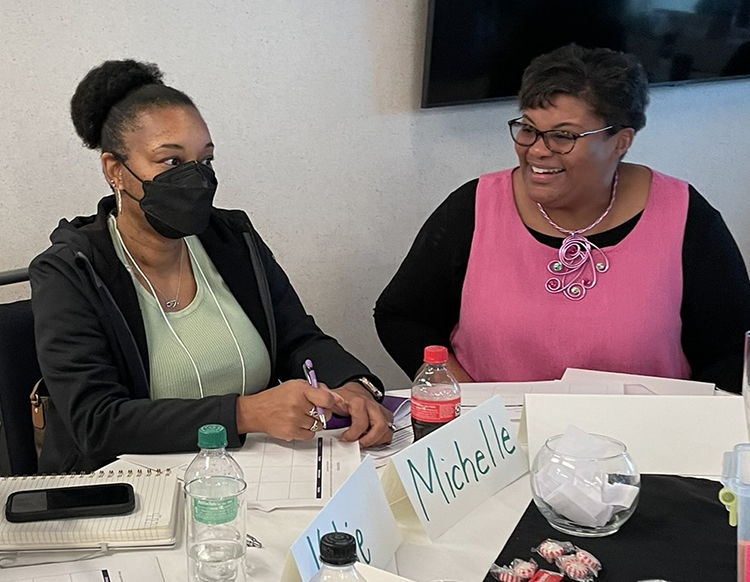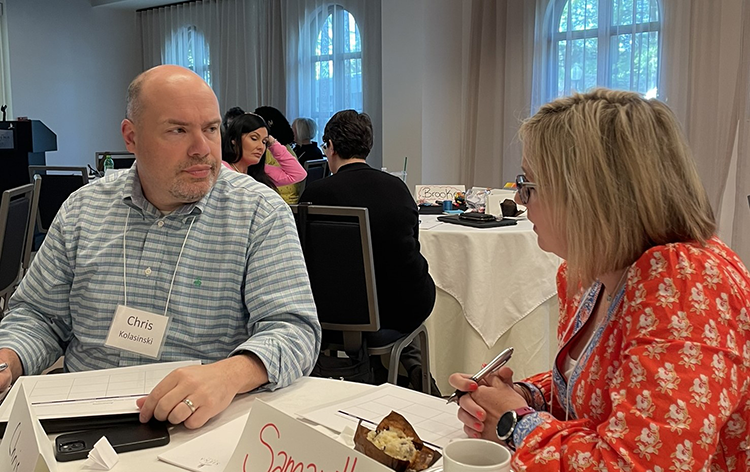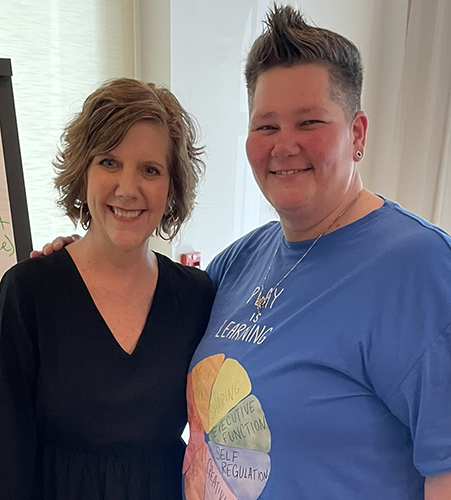Building a Community of Practitioners
Improving Experiences for Preschool to Third Grade Children and All Who Support Their Education and Development

SERVE’s Preschool–3rd Grade Distinguished Leadership Institute (DLI) Meeting convened on April 12, 2024, in Chapel Hill. Carla Garrett, Program Specialist for the Comprehensive Center Network’s Region 6 (RC6) at SERVE, was joined by Dr. Sharon Ritchie, Senior Research Scientist (ret.), Frank Porter Graham Child Development Institute, and Dr. Eva Phillips, early learning consultant, as presenters for the day-long institute. Members of the Preschool–3rd Grade DLI Cohorts I, II, and III were in attendance, plus guests interested in being a part of Cohort IV.
Children Come First — Building Relationships is #1
Garrett noted during her presentation that the work being done at SERVE is framed around the white paper, Children Come First: Ensuring School Policies, Practices, and Strategies Lead to Positive 3rd Grade Outcomes.” She said, “all of our professional development comes out of that paper, including ensuring equitable access to high quality learning, making the connections in terms of alignment, and most of all, a focus on the child and content pieces. We are here to build relationships first of all, and to help you continue to grow your community of practice.”
Two key topics covered in the institute were universal needs and parallel process. Dr. Ritchie spoke about “relatedness and how people who feel related to those around them are able to function as productive members of a community.” Ritchie added, “People who feel related are better able to interact effectively with others, and to give and accept responsibility, cooperate, have compassion, and show respect.”
As noted in the white paper, Children Come First: Ensuring School Policies, Practices, and Strategies Lead to Positive 3rd Grade Outcomes, “a parallel process is one in which the conditions considered desirable for one group are the very same as those established for others.”
During her presentation, Dr. Phillips spoke about the importance of building relationships. “We are thrilled to be working on this project with all of you. It’s my life’s passion to share with educators this important information and we hope that you get both guidance and ideas,” says Phillips.
One segment of the meeting addressed brain research and featured information on toxic stress, memory, self-regulation, and executive function. As Dr. Phillips noted during her presentation, “All of our children are experiencing more toxic stress than ever before. The pandemic bumped toxic stress up to the next level. It has a powerful, unfortunate effect on children in that it can derail healthy development. Play reduces toxic stress and joy is the opposite of toxic stress.”

What Cohort Participants Have to Say

Tracy Cole who has been in the Preschool–3rd Grade Distinguished Leadership Institute since the beginning as part of Cohort I, is Principal of East Carolina University’s Community School in Greenville.
“We are one of nine laboratory schools in the UNC system. This has been an amazing journey participating in the cohort from the very beginning. The support and one-on-one time to listen has been invaluable,” says Cole.
Sam Mehrlich is a member of Cohort II. She is a 24-year veteran kindergarten teacher at Catawba Springs Elementary in Lincoln County. Sam says, “It is a positive and enlightening opportunity for me to be with educators in North Carolina that are passionate about working with young children. The importance of building the transition between the PreK world and early learning. We spend so much time in our own bubble that it’s important to see people from across the state and I feel like I have an opportunity to do something with the things I’m hearing and learning. I enjoyed the interactions from being a part of the cohort. It’s nice to know that there are people advocating for early childhood.”


Ro Lewis, Coordinator of Professional Development and Outreach for NC Infant and Early Childhood Mental Health Association says, “The facilitators of SERVE’s Distinguished Leaders Institute act as conductors for the various organizations and stakeholders working with children birth through third grade so that all the entities in all the counties can work together like a symphony to make the beautiful music needed to sing our next generations into the future. It’s empowering to be in a community of people working for the same goal and it keeps your hope afloat!”
Making and Keeping Connections
“One part that we love about this project is making and keeping connections,” says Garrett, who spoke about the importance of the development of the prefrontal cortex in executive function and self-regulation and how it ties into the ability to manage one’s emotions and behavior. “Children cannot learn to self-regulate when regulated by adults,” she added.
SERVE’s Preschool–3rd Grade Distinguished Leadership Institute is offered through the Region 6 Comprehensive Center (RC6) at SERVE at UNC Greensboro. Learn more about RC6 here.
Garrett, C., Ritchie, S., Phillips, E.C. (2021). Children Come First: Ensuring School Policies, Practices, and Strategies Lead to Positive 3rd Grade Outcomes. Greensboro, NC: SERVE Center at UNC Greensboro.
In addition to the white paper, read 10 briefs in the Children Come First series found on the RC6 Resources page under the Early Childhood tab.
Post and photos by: Judi Rossabi, SERVE Communications Specialist





